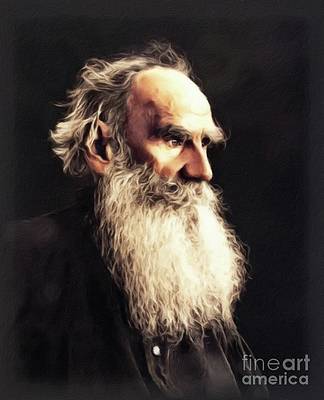Leo Tolstoy Archive
Written: 1887
Source: "A Russian Proprietor and Other Stories," by Leo Tolstoy, translated by Nathan Haskell Dole, 1887, published by Thomas Y. Crowell & Co., New York, 13 Astor Place.
Transcription/Markup: Andy Carloff
Online Source: RevoltLib.com; 2021

Almost stumbling against the prince, the young wife precipitately set down the tub, showed a little embarrassment, dropped a courtesy, and then with shining eyes glanced up at him, and, endeavoring to hide a slight smile behind the sleeve of her embroidered shirt, ran up the steps, clattering in her wooden shoes.
"Mother,[20] you take the water-yoke to aunt Nastásia," said she, pausing at the door, and addressing the old woman.
The modest young proprietor looked sternly but scrutinizingly at the rosy woman, frowned, and turned to the old dame, who, seizing the yoke with her crooked fingers, submissively lifted it to her shoulder, and was about to direct her steps to the adjacent hut.
"Your son at home?" asked the prince.
The old woman, her bent form bent more than usual, made an obeisance, and tried to say something in reply, but, suddenly putting her hand to her mouth, was taken with such a fit of coughing, that Nekhliudof without waiting went into the hut.
Yukhvanka, who had been sitting on the bench in the "red corner,"[21] when he saw the prince, threw himself upon the oven, as though he were anxious to hide from him, hastily thrust something away in the [31]loft, and, with mouth and eyes twitching, squeezed himself close to the wall, as though to make way for the prince.
Yukhvanka was a light-complexioned fellow, thirty years of age, spare, with a young, pointed beard. He was well proportioned, and rather handsome, save for the unpleasant expression of his hazel eyes, under his knitted brow, and for the lack of two front teeth, which immediately attracted one's attention because his lips were short and constantly parted.
He wore a Sunday shirt with bright red gussets, striped print drawers, and heavy boots with wrinkled legs.
The interior of Vanka's hut was not as narrow and gloomy as that of Churis's, though it was fully as stifling, as redolent of smoke and sheep-skin, and showing as disorderly an array of peasant garments and utensils.
Two things here strangely attracted the attention,—a small damaged samovár standing on the shelf, and a black frame near the icon, with the remains of a dirty mirror and the portrait of some general in a red uniform.
Nekhliudof looked with distaste on the samovár, the general's portrait, and the loft, where stuck out, from under some rags, the end of a copper-mounted pipe. Then he turned to the peasant.
"How do you do, Yepifán?" said he, looking into his eyes.
Yepifán bowed low, and mumbled, "Good-morning, 'slency,"[22] with a peculiar abbreviation of the last word, while his eyes wandered restlessly from the prince to the ceiling, and from the ceiling to the floor, [32]and not pausing on any thing. Then he hastily ran to the loft, dragged out a coat, and began to put it on.
"Why are you putting on your coat?" asked Nekhliudof, sitting down on the bench, and evidently endeavoring to look at Yepifán as sternly as possible.
"How can I appear before you without it, 'slency? You see we can understand"....
"I have come to ask you why you need to sell a horse? Have you many horses? What horse do you wish to sell?" said the prince without wasting words, but propounding questions that he had evidently pre-considered.
"We are greatly beholden to you, 'slency, that you do not think it beneath you to visit me, a mere peasant," replied Yukhvanka, casting hasty glances at the general's portrait, at the stove, at the prince's boots, and every thing else except Nekhliudof's face. "We always pray God for your 'slency."
"Why sell the horse?" repeated Nekhliudof, raising his voice, and coughing.
Yukhvanka sighed, tossed back his hair (again his glance roved about the hut), and noticing the cat that lay on the bench contentedly purring, he shouted out to her, "Scat, you rubbish!" and quickly addressed himself to the bárin. "A horse, 'slency, which ain't worth any thing. If the beast was good for any thing, I shouldn't think of selling him, 'slency."
"How many horses have you in all?"
"Three horses, 'slency."
"No colts?"
"Of course, 'slency. There is one colt."[33]